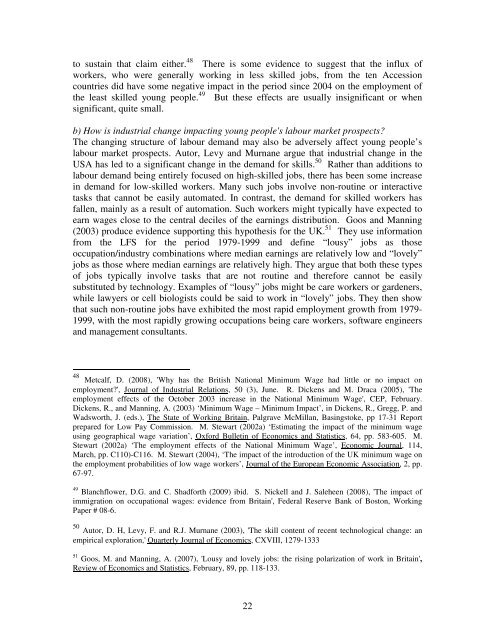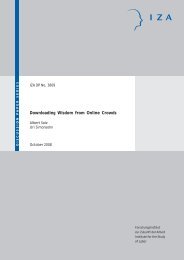Youth Unemployment: Déjà Vu? - Index of - IZA
Youth Unemployment: Déjà Vu? - Index of - IZA
Youth Unemployment: Déjà Vu? - Index of - IZA
You also want an ePaper? Increase the reach of your titles
YUMPU automatically turns print PDFs into web optimized ePapers that Google loves.
to sustain that claim either. 48 There is some evidence to suggest that the influx <strong>of</strong><br />
workers, who were generally working in less skilled jobs, from the ten Accession<br />
countries did have some negative impact in the period since 2004 on the employment <strong>of</strong><br />
the least skilled young people. 49 But these effects are usually insignificant or when<br />
significant, quite small.<br />
b) How is industrial change impacting young people's labour market prospects?<br />
The changing structure <strong>of</strong> labour demand may also be adversely affect young people’s<br />
labour market prospects. Autor, Levy and Murnane argue that industrial change in the<br />
USA has led to a significant change in the demand for skills. 50 Rather than additions to<br />
labour demand being entirely focused on high-skilled jobs, there has been some increase<br />
in demand for low-skilled workers. Many such jobs involve non-routine or interactive<br />
tasks that cannot be easily automated. In contrast, the demand for skilled workers has<br />
fallen, mainly as a result <strong>of</strong> automation. Such workers might typically have expected to<br />
earn wages close to the central deciles <strong>of</strong> the earnings distribution. Goos and Manning<br />
(2003) produce evidence supporting this hypothesis for the UK. 51 They use information<br />
from the LFS for the period 1979-1999 and define “lousy” jobs as those<br />
occupation/industry combinations where median earnings are relatively low and “lovely”<br />
jobs as those where median earnings are relatively high. They argue that both these types<br />
<strong>of</strong> jobs typically involve tasks that are not routine and therefore cannot be easily<br />
substituted by technology. Examples <strong>of</strong> “lousy” jobs might be care workers or gardeners,<br />
while lawyers or cell biologists could be said to work in “lovely” jobs. They then show<br />
that such non-routine jobs have exhibited the most rapid employment growth from 1979-<br />
1999, with the most rapidly growing occupations being care workers, s<strong>of</strong>tware engineers<br />
and management consultants.<br />
48 Metcalf, D. (2008), 'Why has the British National Minimum Wage had little or no impact on<br />
employment?', Journal <strong>of</strong> Industrial Relations, 50 (3), June. R. Dickens and M. Draca (2005), 'The<br />
employment effects <strong>of</strong> the October 2003 increase in the National Minimum Wage', CEP, February.<br />
Dickens, R., and Manning, A. (2003) ‘Minimum Wage – Minimum Impact’, in Dickens, R., Gregg, P. and<br />
Wadsworth, J. (eds.), The State <strong>of</strong> Working Britain, Palgrave McMillan, Basingstoke, pp 17-31 Report<br />
prepared for Low Pay Commission. M. Stewart (2002a) ‘Estimating the impact <strong>of</strong> the minimum wage<br />
using geographical wage variation’, Oxford Bulletin <strong>of</strong> Economics and Statistics, 64, pp. 583-605. M.<br />
Stewart (2002a) ‘The employment effects <strong>of</strong> the National Minimum Wage’, Economic Journal, 114,<br />
March, pp. C110)-C116. M. Stewart (2004), ‘The impact <strong>of</strong> the introduction <strong>of</strong> the UK minimum wage on<br />
the employment probabilities <strong>of</strong> low wage workers’, Journal <strong>of</strong> the European Economic Association, 2, pp.<br />
67-97.<br />
49 Blanchflower, D.G. and C. Shadforth (2009) ibid. S. Nickell and J. Saleheen (2008), 'The impact <strong>of</strong><br />
immigration on occupational wages: evidence from Britain', Federal Reserve Bank <strong>of</strong> Boston, Working<br />
Paper # 08-6.<br />
50 Autor, D. H, Levy, F. and R.J. Murnane (2003), 'The skill content <strong>of</strong> recent technological change: an<br />
empirical exploration,' Quarterly Journal <strong>of</strong> Economics, CXVIII, 1279-1333<br />
51 Goos, M. and Manning, A. (2007), 'Lousy and lovely jobs: the rising polarization <strong>of</strong> work in Britain',<br />
Review <strong>of</strong> Economics and Statistics, February, 89, pp. 118-133.<br />
22
















